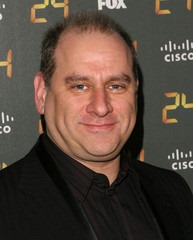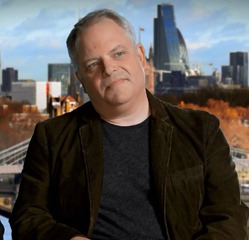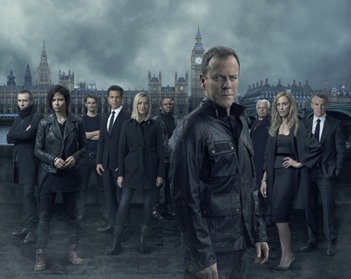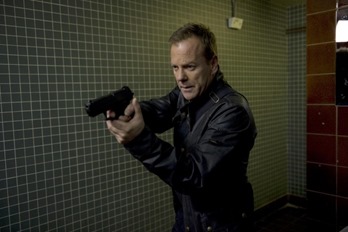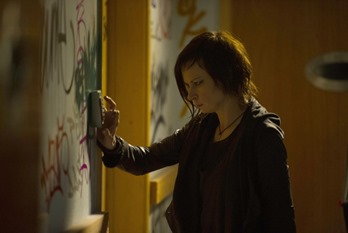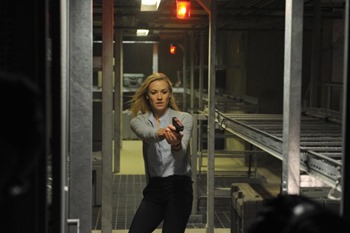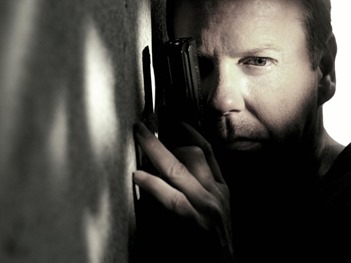On Monday, Fox’s event series 24: Live Another Day (Mondays, 8/7C for the premiere, then 9/8C) premieres, bringing Jack Bauer back after an absence of four years. Set in London, Bauer sets out to prevent the first assassination of a standing President of the United States on foreign soil. We see a very different Bauer – and Chloe O’Brian – than we’ve ever seen before and the stakes are higher than ever.
Last week, I had the pleasure of taking part in a conference call Q&A with the Evan Katz and Manny Coto, the writers and Executive Producers of Fox’s event series 24: Live Another Day – after screening the first two episodes. They talked about the changes of circumstance for Jack and Chloe; the genesis of new characters, like Agent Kate Morgan – and the reasons they went with the threat they chose.
Hi, guys. Thanks for your time today; appreciate it.
Evan Katz: Hi.
Manny Coto: Hi.
So, guys, obviously not too many shows get a second chance like this. I’m wondering, especially for Kiefer and for Mary Lynn, but also for Kim and for William, how did the actors approach 24 the second time around?
Evan: This is Evan. I think that Kiefer wanted to make sure that he understood where the character had been and somewhere interesting to go with the character when we sat with him. And for Bill Devane the same was true; we’re doing something interesting with his character we don’t want to reveal. He’s president, but there’s another big issue he’s wrestling with.
And the same for Kim Raver and Mary Lynn. Mary Lynn’s character has had quite a radical journey, which over the first three episodes becomes clear. For Kim Raver, the last time we saw her, she was catatonic. So, of course, she came in and we chatted with her about what she had been through.
So everyone, kind of before they shipped off to London, we were all on the same page.
Obviously, you know, the fans couldn’t be happier that the show is coming back, the critics are excited that the show is coming back. What excited you guys about bringing the show back?
Manny: This is Manny. A lot of things excited us. I think there was a feeling amongst all of us – even though when season 8 finished, and we were tired and we were kind of ready to move on – I think all of us felt that there was more to this story and that Jack Bauer’s character was not quite ready to shuffle off the stage. Of course, there was talk of a movie, so it was generally agreed that there would be more.
So when this came around, I think a lot of our thoughts that we had been kind of percolating over the years kind of bubbled forth. I think both of us experienced people coming up to us saying I wish that show were still on the air; I miss the show; I miss Jack Bauer. And I think, you know, when the opportunity appeared, we had kind of a reservoir of ideas and thoughts about this character and where he would be now that we were able to draw on.
Particularly exciting is because he is a fugitive – he was a fugitive – and on the run from his own government. A man who had saved the United States multiple times, that same country has turned its back on him. So that is a fantastic dynamic to start a series and something that we seized on and really energized us.
At the same time, the idea of Chloe O’Brian also being, kind of, a fugitive, almost as much a fugitive as Jack, having turned her back against the government, as well. You take these two characters and you say to yourself, you know, there is an event that requires the two of them to work together to come back together and work against the very – and at the same time, try to help the government. Save Americans, but at the same time fighting the very government that gave them this opportunity. It’s a great dynamic we’ve decided to explore.
With the success you see on shows like, you know, True Detective, other event shows over on FX with Fargo, what advantages do you see that something like a short run event series has today on TV.
Evan: I think – this is Evan – I think that in terms of an ability to platform something special – I think in 24’s case, where people’s viewing habits have changed, asking people to devote 24 consecutive weeks to a highly serialized show, you know, maybe is a bigger ask than it was 10 years ago. So I think one advantage in this case is I think it’s more inviting.
I also think it is more special. It’s not going to happen all the time; it’s not taking place over a year. This is a chunk of time. And it gives the network the opportunity to put more oomph behind its launch.
I was curious – you know, your show has always been very vested in what’s been going on in the political sphere. I was wondering what kind of shifts in the political world you were interested in the last couple years since it’s gone off the air and how they informed crafting the new season.
Manny: Hi, this is Manny. There were a number of political developments over the years that we seized upon when we started conceiving the season. Things that were in the zeitgeist, things that were talked about, that we felt could lead us to a really interesting, possible villain and character for the season. That is the whole idea of government spying on its citizens and the technology and consequently individuals who appear who are trying to fight that and to counter that level.
So it led us to a fascinating character in the season who is doing just that. And it also gave us an idea for what to do with Chloe O’Brian. See, she is someone, like Jack, who has turned against the government. Jack is a man of action, so when he turns against the government, he goes, you know, in a different direction. Chloe, someone who lives behind the keyboard, how does she get “revenge?” Well, she goes the Edward Snowden route. So it opened up some interesting possibilities for the Chloe character.
And also the idea of drones, which have become larger in the military landscape since the show was on. I think we featured a drone on one season in the first eight years. But, at that time, the drones were kind of smaller and flimsier and didn’t look particularly menacing. Now, the drones that are in reality and are in operation now and some that are on the drawing board are large, menacing things from the sky that can blow up entire buildings.
We wanted the show to have a flavor of its old self, but also to take into account the changes that have gone on.
Great. Then, for a followup question, this season starts in London. Can you talk a little bit about your decision to take the show there and what it was like to bring the action to London?
Evan: This is Evan. You know, Jack is put into exile at the end of season eight, so I think that initially gave us the idea that, you know, sure, we could start him back here, but wouldn’t it be great for him to still be in exile? And I think it was also an opportunity – we’d been in L.A. for the show’s run, even though we sometimes set in other cities, to sort of truly take it international.
A couple of cities were mentioned, but London is A) full of this great iconography, and B) part of the story line is, is the Anglo-American alliance, which is also really interesting in the potential strings, not only that it’s actually come under because of the Iraq war, but that it’s going to come under because of Jack Bauer.
I love the show. I’m glad it’s back. I’m sure that you have heard many times and laughed at the comments that people make over the years about why Jack Bauer never goes to the bathroom. I know Kiefer’s even commented about that before. And this format with 12 hours, not only does it make it possible that you all can, you know, that’s not an issue anymore, but also more important dramatically, it allows you to just focus on the really good parts of the story and not have as much risk of a slower subplot. I was wondering if you would comment about that.
Manny: Hi, this is Manny speaking. Yes, the 12 hours allows us to really condense the story telling. In a 24-hour season, we kind of knew how many episodes we had to fill and where we had to go. And very often, during a season, we’d find ourselves trying to stretch out plots as much as they could go to fill up the vast material.
Here, we find ourselves really compressing the action. We’re finding ourselves, very often, a little short of the runway as far as finishing off plots and coming up to the end of the season, and it’s very challenging. So it is definitely an accelerated form of storytelling that we’re working with this year.
And if I can just address the old when does Jack go to the bathroom? I’ve got to confess, I’ve always found that the strangest comment.
It is. I don’t want to see him go to the bathroom, frankly.
Manny: Jack – two things. Jack is off-screen for huge amounts of time on this show. I mean, he is. So why couldn’t he be going to the bathroom then? It’s not like the camera is following him around and he’s on-screen the entire season. So people constantly quote that as if it’s the most –
Evan: Pithy.
Manny: – pithy revelation. And I always look at them and say well Jack’s going to the bathroom when we’re on the president, which sometimes takes an entire act.
There you go.
Manny: It’s a very strange comment.
Well, there’s a lot of it, and that’s why I even brought it up. But thank you so much.
Manny: I understand, and I know you’re just quoting, and I understand. But if it actually had any weight to it – because the answer is so obvious, it boggles me as to why, actually, people puzzle over it.
Evan: We’re hoping this was the last word.
Manny: But you know what I’m saying? He actually does go to the bathroom; we just don’t see it.
Okay, I’m cool with that.
Manny: By the way, the other characters go to the bathroom, as well, and we don’t see them either.
What was the greatest challenge of bringing the show to London?
Evan: This is Evan. You know, the greatest challenge was making sure that Jon Cassar, our fantastic producer/director, could go there and get everything set up. He was with the show for most of its initial run, and he has managed to recreate look without, really, any of the key players.
Other than that, it really has been a tremendously smooth experience. We have a great film line producer there, Ian Smith. The film culture there and the production culture there is really fantastic and there’s wonderful craftspeople. So of all our challenges this year, London was a shining star. That’s not been our challenge.
Okay. And you’ve got some fantastic British talent in the series – Stephen Fry and Michelle Fairley – were people biting your hand off to become a part of 24?
Evan: We have all our hands still in residence. You know, people have been very open minded. You know, people seem to be excited to be on the show, whether it’s Stephen Fry or Ben Bratt or Yvonne Strahovski. I will say it’s really been wonderful to have access to the British acting pool of these wonderfully, classically trained actors, from Michelle to this woman, Emily Berrington, who’s at the beginning of her career, and just one after another, fantastic people. John Boyega.
I was just wondering, any real fan of the show knows how important Chloe O’Brian is to the show and how important she is to Jack. I was wondering, you know, we’ve never seen her quite like this before, and her introduction into the series is radically different. I was wondering how did you guys come to that idea, and why?
Manny: When we left season eight – this is Manny speaking. When we approached this season, this 12-episode event, we wanted it to be something special, something different, something that will surprise, that fans will like, but will also surprise them. And we also had to take into account that four years have passed and the characters have changed radically.
At the end of season eight, the last time we saw them, Jack was sent into exile for crimes he had committed against the state and against the Russians. But the person who helped Jack go into exile was Chloe O’Brian. The very last scene of the series is Chloe turning off the satellite so Jack can get away.
Well, we have to go with that; we can’t just ignore that. So the obvious place to go is that Chloe O’Brian herself came under scrutiny, herself was charged, and herself became a fugitive. Jack became a fugitive in his way; he’s a man of action. He went where he went. And Chloe, who is somebody who lives her life behind a keyboard, took up “arms against the government” in her way, and became embittered and suffered her own personal tragedy. I don’t know how far you were into the series, but things will be revealed as far as what she went through.
So it gives the characters a place to go to. A) It’s surprising, we haven’t seen them this way before. But we also get the dramatic reward of seeing them, possibly, come together again. And possibly reawaken their old selves.
Cool. As a followup, I was just wondering, Yvonne Strahovski is amazing in this, and Kate Morgan strikes me as having the potential to be a kind of female equivalent of a young Jack Bauer. I was wondering how that character developed?
Evan: This is Evan. We really liked the idea of very, very early on bringing in a female point of view character. I’d say the first, at least, month or so of talking about the new season was largely focused on who this woman would be, what her backstory would be, and there was a lot of trial and error, but we wanted to make sure she had a wound, some kind of wound that pursuing Jack Bauer might potentially heal. We also wanted to make sure that there was the potential for her to be able to relate to Jack in terms of personal tragedies they had experienced.
I wanted to see if you guys could explain the decision to condense the show from 24 hours into 12 episodes as opposed to, you know, maybe doing something like 24: Redemption did, where it was 2 hours of real time. Is there a reason why you guys opted to condense the 24 hours as opposed to just doing 12 realtime hour episodes?
Manny: Hi, this is Manny. Well, first of all, the 12 hours are like 24: Redemption. This is a realtime series and it remains a realtime series. There’s no difference in the way we are treating the show itself. All we are doing is presenting 12 hours out of a 24-hour period. But the episodes themselves are realtime, as Redemption was and as the original series was.
The idea for this, to do a 12-hour season, I think has a lot to do with the success of 12-hour, limited series. I think Under the Dome was something that probably sparked the network and/or the studio’s curiosity about doing something like this. It makes it a special event; it makes it something to catch.
We’re not restarting the series, we are presenting the next day in Jack Bauer’s life, and in the 12-hour format, it becomes a, hopefully, a must watch event because it’s a one-time thing. So I think the 12-hour format was attractive in that respect.
I also allows us to, you know, for us, as writers, it’s been fun to condense the storytelling into this 12 hours. I mean, we find ourselves, when we look down the runway of the season, we don’t have 24 hours to fill, whereas in the old series, very often we might try to stretch things out because we knew we had so much time. Now we’re finding ourselves with the end in sight and really working to resolve all of our story lines. So it’s becomes more compressed and more exciting, we think.
When you spoke earlier about spying and technology – I was wondering how has Jack remained underground in today’s environment?
Evan: This is Evan. You know, living off the grid is something that I think is really interesting to us. Most of what happened over the last four years at least begins as a mystery, which we unpeel a little bit over the course of the 12 episodes. We just simply assume that someone with Jack Bauer’s tremendous skill set and knowledge – since he was a hunter, he knows how to avoid hunters.
Thank you. As a followup, could you talk a little bit about how he fits into the world now that he has to go back into Action Jack Mode?
Manny: Hi, this is Manny. One of the fun things about this season is that, actually, Jack doesn’t fit into the world. It’s a challenge for him to find his place back into the world, and that’s actually part of what this season is about. Can Jack return to what he was? And the question is definitely up in the air.
This is a man who wasn’t just exiled, but something has happened to him over these four years where he has been in exile and he has been running. There is a mystery as to what he was up to, there. Did Jack go through a period where he was not a hero? Where he turned, for lack of a better phrase, to turn to the Dark Side? We don’t know. But it’s an interesting mystery. I’m saying we know, but you don’t know, yet. It’s an interesting mystery that’s part of the season. You hit upon – one of the themes that we’re working with is that Jack possibly return to this world?
I’m wondering why do people who have never watched an episode of 24 have to watch this series?
Evan: This is Evan. I think that we’re delivering something that’s not on TV right now. I think it’s just as intense a thriller as it ever was. I think, if anything, it’s on a larger scope, and the scale is extremely impressive. It’s a much more international show.
You don’t need to have, certainly, watched 24 before – we’re very careful to make sure people are brought up to speed. But we just feel that Jack Bauer’s become part of the cultural iconography out there and this is a good, 12-week – actually 11-week, because the first two are airing in one night – way to have a great roller coaster ride. If you haven’t seen it, see what all the fuss was about.
Great. My followup question is the both of you have worked on some pretty high profile series since 24 – Awake, Dexter. Has working on these shows changed your approach to 24?
Manny: This is Manny. I would say, probably, in my case, I can’t speak for Evan, I would say no. I was on 24 before Dexter – I was on Dexter – and I was on 24 before Dexter, and I found that Dexter, in many ways, was not unlike the character of Jack Bauer. I mean, it was a different style of writing Dexter. Totally different. Dexter, you know, was filled with dark humor.
But, in a very interesting way, both characters had similar challenges, that they were both outsiders who were trying to right wrongs and were both anti-heroes, or became anti-heroes. Dexter’s, obviously, a much more radical anti-hero than Jack was. But they both kind of went in the same arch, meaning they both ended up losing, at least in Dexter’s case, ended up losing everything he tried to gain because of who he is, and that’s not dissimilar to what Jack Bauer goes though. In fact, the more lives he saves, the worse his own life seems to become.
So for my case, it was simply just a change of tone. The storytelling techniques were not that dissimilar. 24 has its very own style, and you really have to just be able to kind of shift over to the 24 rhythm and speed.
Evan: This is Evan. I would say that it’s rare for anyone to be on a show where all the elements came together and found themselves and the show became this tremendous thing. I would say I’ve enjoyed all the work I’ve done since, but it felt really good to get back into the driver’s seat here.
I loved the first two episodes.
Evan: Thank you.
Really wonderful. Could there be another season – or if you want to call it another event – if this does as well as we hope it does?
Manny: This is Manny. Nothing is impossible, but we are treating this season as a one-time miniseries. A one-time series event. It has a beginning, a middle, and an end, and the ending could be the end of 24 for good, if you look at it that way. It depends on how you look at it.
I guess my answer is: it’s possible, certainly. Obviously, it’ll depend on eyeballs, if people tune in. But one thing to keep in mind is we all came back to tell this one last story, one last day in Jack Bauer’s life. If there’s more beyond, we’ll cross that bridge when we get there.
Good. You probably can’t say, but will Tony and/or Kim be back?
Evan: We can’t say.
Manny: Yes, we can’t say.
Evan: You are correct.
Correct, okay. Well, that’s good.
Manny: We will neither confirm nor deny.
Okay, thanks very much.
Manny: Thank you.
Episodic photos by Daniel Smith and Greg Williams/Courtesy of Fox
